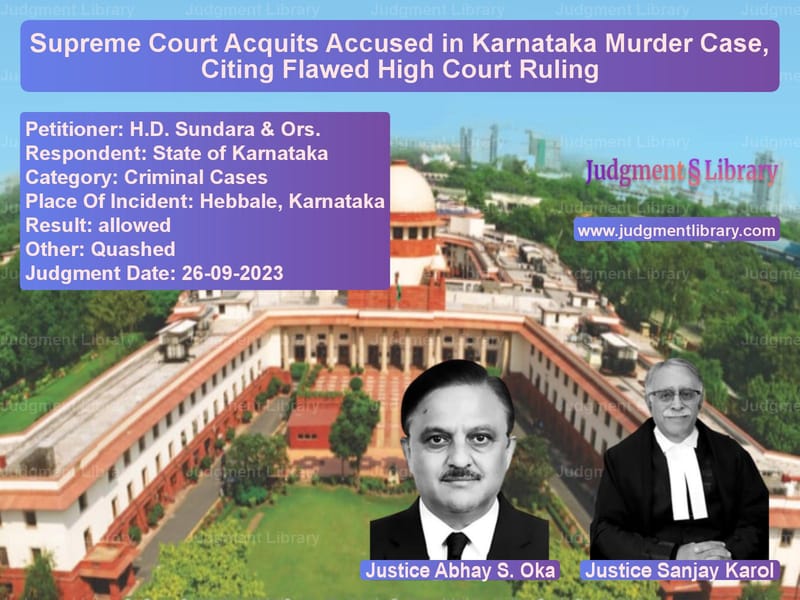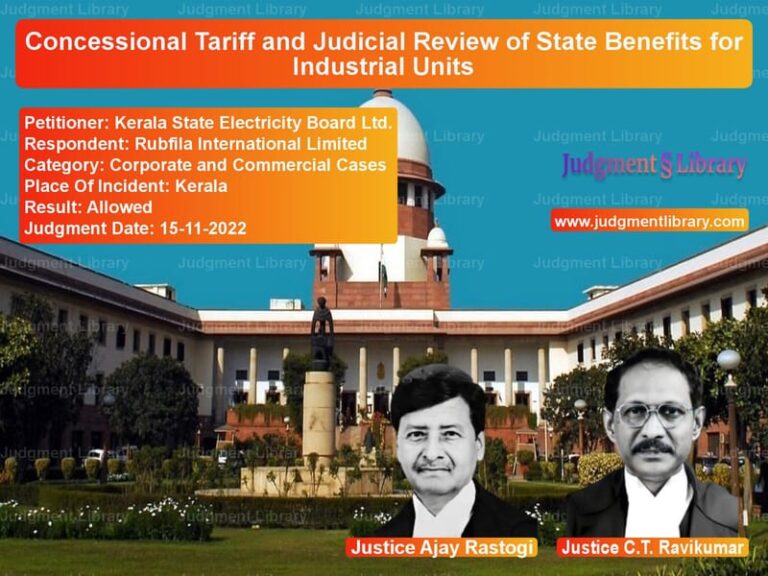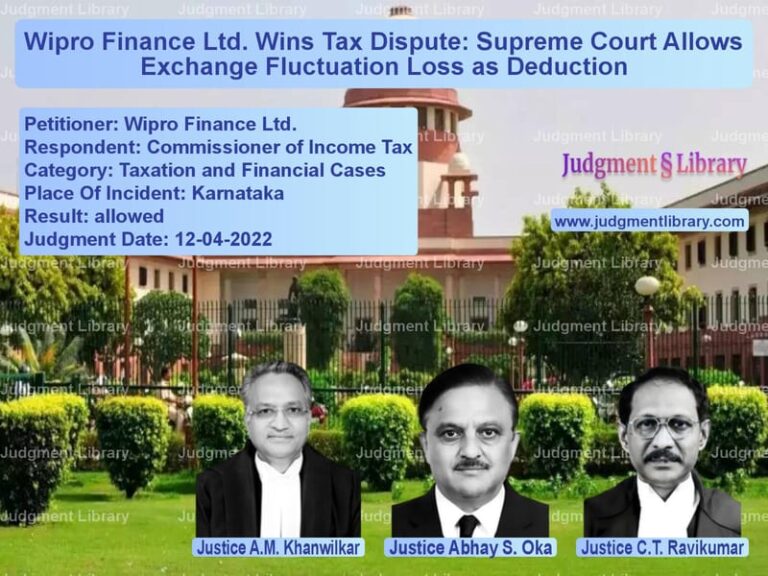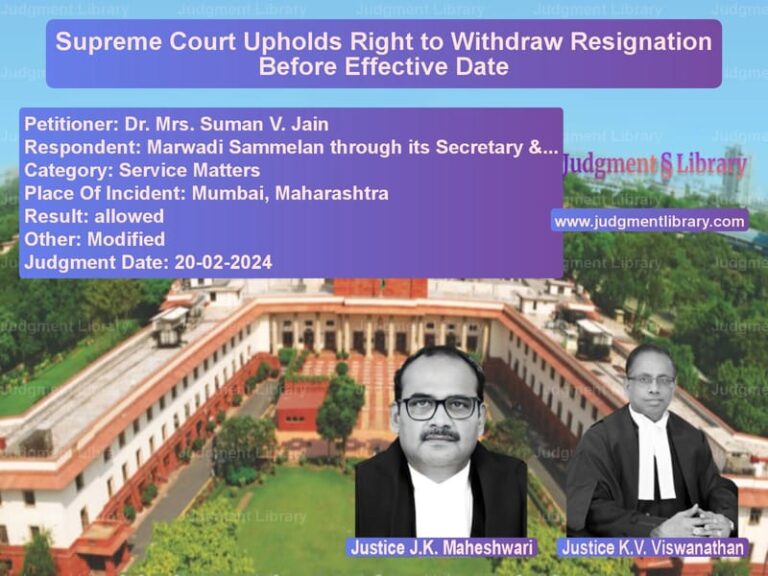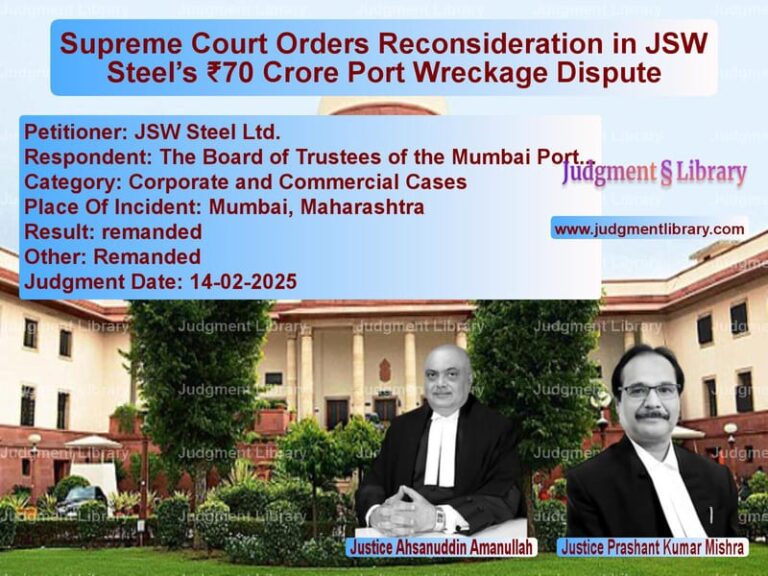Supreme Court Acquits Accused in Karnataka Murder Case, Citing Flawed High Court Ruling
The Supreme Court of India recently delivered a crucial judgment in the case of H.D. Sundara & Ors. vs. State of Karnataka, addressing the validity of a Karnataka High Court ruling that overturned a trial court’s acquittal in a murder case. The Supreme Court reinstated the acquittal, ruling that the High Court had failed to apply the correct legal principles while reversing the trial court’s decision.
The case involved a property dispute between relatives in the village of Hebbale, Karnataka, which escalated into violence, resulting in the deaths of two individuals. The trial court acquitted all the accused, but the High Court overturned this verdict and convicted them under Section 304 (Part I) and Section 324 read with Section 149 of the Indian Penal Code (IPC). The Supreme Court, however, ruled that the High Court’s decision lacked adequate reasoning and failed to consider the trial court’s assessment of the evidence.
Background of the Case
The case arose from a violent confrontation on August 29, 1999, in the village of Hebbale. The dispute was between the complainant’s family and the accused, who were relatives, over access to water.
Key Events:
- Two victims, Manjunatha and Shivarama, were allegedly attacked with weapons, including clubs, sticks, and knives.
- Witnesses, including PW-1 (Jagadeesha), claimed that they saw the accused assaulting the victims.
- The trial court acquitted all the accused, citing inconsistencies in the evidence and the prosecution’s failure to explain the injuries suffered by the accused.
- The Karnataka High Court overturned the acquittal and convicted the accused, sentencing them to seven years of rigorous imprisonment.
- The Supreme Court was approached to examine whether the High Court was justified in reversing the acquittal.
Key Legal Issues Considered
- Whether the High Court had correctly applied the principles governing the reversal of an acquittal.
- Whether the evidence presented by the prosecution was sufficient to prove guilt beyond a reasonable doubt.
- Whether the accused’s injuries and the prosecution’s failure to explain them affected the case’s outcome.
Petitioner’s Arguments (H.D. Sundara & Ors.)
The appellants, represented by senior counsel, contended that:
- The High Court had failed to assess whether the trial court’s view was a possible and reasonable conclusion based on the evidence.
- The trial court had considered the testimony of eyewitnesses and found inconsistencies, making acquittal a reasonable outcome.
- The prosecution failed to explain the injuries suffered by the accused, indicating that they were also victims in the altercation.
- The High Court had convicted the accused without properly addressing the principles governing appeals against acquittals.
Respondent’s Arguments (State of Karnataka)
The prosecution argued that:
- The delay in registering the FIR was minor and had been explained.
- The evidence of eyewitnesses, including PW-1, PW-2, and PW-6, clearly established the involvement of the accused.
- The injuries on the accused did not negate their role in the crime, and the prosecution’s failure to explain them was not fatal to its case.
- The High Court was justified in overturning the acquittal because the trial court had erred in its appreciation of the evidence.
Supreme Court’s Analysis
The Supreme Court outlined the legal principles governing appeals against acquittals:
- An acquittal strengthens the presumption of innocence, and appellate courts must be cautious in reversing such decisions.
- The High Court must assess whether the trial court’s conclusion was a possible view based on the evidence.
- If two views are possible, the appellate court should not interfere unless the trial court’s view is unreasonable.
- The High Court must provide detailed reasoning when overturning an acquittal.
The Supreme Court found that the High Court had failed to follow these principles:
- The High Court did not provide specific findings regarding each accused’s role in the crime.
- There was no analysis of whether Section 149 IPC (unlawful assembly) applied to all accused.
- The High Court did not assess the trial court’s concerns regarding inconsistencies in witness testimonies.
The Court observed:
“The High Court, as an appellate court, while hearing the appeal against acquittal, has not done its duty.”
On the prosecution’s failure to explain the injuries on the accused, the Court stated:
“The failure to investigate the cause of injury suffered by the accused is a serious lacuna in the prosecution’s case.”
Final Judgment
The Supreme Court set aside the Karnataka High Court’s judgment and reinstated the trial court’s acquittal. It ruled that:
- The High Court failed to apply the correct legal standards for reversing an acquittal.
- The trial court’s findings were based on a reasonable assessment of the evidence.
- The prosecution had not established guilt beyond a reasonable doubt.
- The accused, if not required in any other case, should be released immediately.
The Court concluded:
“The appeal succeeds, and we set aside the impugned judgment dated September 21, 2010. The accused shall be forthwith set at liberty unless required in another case.”
Implications of the Judgment
- Reinforces the principle that acquittals should not be reversed without strong justification.
- Ensures that appellate courts provide detailed reasoning when overturning lower court decisions.
- Highlights the importance of considering inconsistencies in witness testimonies.
- Emphasizes that the prosecution must account for all relevant evidence, including injuries suffered by the accused.
Conclusion
The Supreme Court’s ruling in this case is a crucial reaffirmation of the legal principles governing appeals against acquittals. By reinstating the trial court’s verdict, the Court has emphasized the importance of procedural fairness and the presumption of innocence. This judgment serves as a vital precedent for future cases where appellate courts seek to overturn acquittals, ensuring that such decisions are based on sound legal reasoning.
Petitioner Name: H.D. Sundara & Ors..Respondent Name: State of Karnataka.Judgment By: Justice Abhay S. Oka, Justice Sanjay Karol.Place Of Incident: Hebbale, Karnataka.Judgment Date: 26-09-2023.
Don’t miss out on the full details! Download the complete judgment in PDF format below and gain valuable insights instantly!
Download Judgment: h.d.-sundara-&-ors.-vs-state-of-karnataka-supreme-court-of-india-judgment-dated-26-09-2023.pdf
Directly Download Judgment: Directly download this Judgment
See all petitions in Murder Cases
See all petitions in Attempt to Murder Cases
See all petitions in Judgment by Abhay S. Oka
See all petitions in Judgment by Sanjay Karol
See all petitions in allowed
See all petitions in Quashed
See all petitions in supreme court of India judgments September 2023
See all petitions in 2023 judgments
See all posts in Criminal Cases Category
See all allowed petitions in Criminal Cases Category
See all Dismissed petitions in Criminal Cases Category
See all partially allowed petitions in Criminal Cases Category

